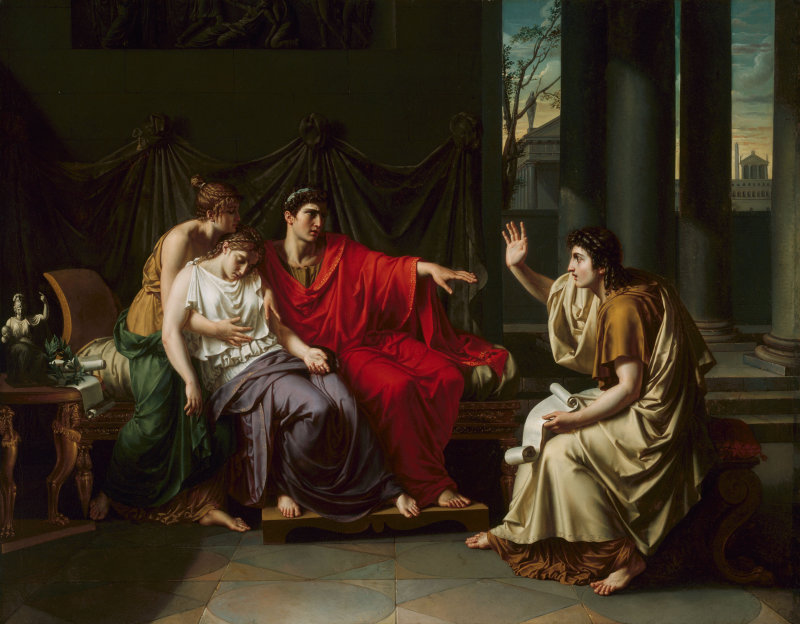Welcome to Vergil's Georgics
HIS 199-14 Fall 2013
Tuesday 12-2 p.m.
Classical Studies Seminar Room
J. Lynn

Art Institute of Chicago: Jean Baptiste Joseph Wicar (French, 1762-1834) Virgil Reading the "Aeneid" to Augustus, Octavia, and Livia.
Summer Reading:
- Everitt, Anthony. Augustus: the life of Rome's first emperor. Random House, 2007. ISBN 978-0812970586
- Virgil. Aeneid. Translated by Robert Fagles; introduction by Bernard Knox. Penguin, 2008. ISBN 978-0143105138
Required for Class:
You'll need a text of Vergil; any one of the following will do:
- Williams, R. D., ed. Virgil: The Eclogues and Georgics. Bristol Classical Press, 1998. ISBN 978-1853995088 (this single volume has text and commentary, and is keyed to less experienced readers of Latin)
- Mynors, R. A. B., ed. P. Virgili Maronis Opera. Oxford University Press, 1969. ISBN 978-0198146537 (this is the Oxford Classical Text with text only, no commentary; you'd definitely need a commentary at your side as well)
- Thomas, Richard, ed. Virgil: Georgics, Vol. I, Books I-II. Cambridge University Press, 1988. ISBN 978-0521278508 and Thomas, Richard, ed. Virgil: Georgics, Vol. II, Books III-IV. Cambridge University Press, 1988. ISBN 978-0521346788 (this two-volume set -- you'd need both -- has text and a great commentary, but is pricey)
If you don't have a dictionary, I'd recommend:
- Traupman, John. The Bantam New College Latin & English Dictionary. Third Revised Edition. New York: Bantam, 2007.
This one sells for $5.99 on amazon.com.
Class Requirements
- Attendance and preparation (essential, because we want to move through as much text as possible), translation tests (to be taken outside of class time) and a final paper of 10 pages (plus rough draft and peer editing). For week-by-week assignments, see below:
Week 1
- Vergil's life and work in its historical context
- Eclogues 1 and 4
Week 2
- 1.1-42 Invocation
- Adler, E. "The Invocation to the Georgics." Interpretation 11: 25-41.
Week 3
- 1.118-159 Theodicy
- Jenkyns, R. "Labor improbus." CQ 43: 243-248. (reprinted in Volk 2008)
Week 4
- 1.464-514 Peroration: Civil War
- Kaster, R. A. "Invidia and the End of Georgics 1." Phoenix 56 (2002): 275-295. (on Eclogue 1 and the end of the Georgics)
- Lyne, R. O. A. M. "Scilicet et tempus veniet...: Virgil, Georgics 1.463-514." In A. J. Woodman and D. West (eds.) Quality and Pleasure in Latin Poetry. Cambridge: Cambridge University Press, 1974, 47-66.
Week 5
- 2.109-176 Laudes Italiae
- Putnam, M. C. J. "Italian Virgil and the Idea of Rome," In L. L. Orlin (ed.), Janus: Esays in Ancient and Modern Studies. Ann Arbor: University of Michigan Press, 1975, 171-199. (reprinted in Volk 2008)
Week 6
- Read especially closely in English:: 2.315-345 Spring; 2.458-474 Happy Farmer
- In Latin: 2.475-542 Golden Age
- Hesiod's description of the Ages, from Hines, Daryl, trans. Works of Hesiod and the Homeric Hymns. Chicago: University of Chicago Press, 2004.
- Aratus' description of the ages of man, from his Phaenomena, excerpted from Mair, A.W. and G.R. Callimachus, Hymns and Epigrams. Lycophron. Aratus. Loeb Classical Library Volume 129. London: William Heinemann, 1921.
- The ending of Catullus 64, excerpted from a translation by Thomas Banks for Diotima: Sources for the Study of Women and Gender in the Ancient World.
Week 7
Continue with the Golden Age reading above; read Eclogue 4 (on your Eclogues handout) in English. Read the second passage on your Lucretius handout (the long one from Book V) and make an outline of the various developments he charts (clothing, sailing, metals, etc.). How are they positively or negatively characterized? How does this contrast with the descriptions of mankind's history in Hesiod, Aratus, and Catullus?
Week 8
- Read especially closely in English: 3.1-48 Third Proem
- Thomas, R. F. "Callimachus, the Victoria Berenices and Roman Poetry," CQ 33 (1983): 92-113. (reprinted in Volk 2008)
- In Latin: 3.209-283 Horses and Lust
- Knox, Peter E. "Love and Horses in Virgil's Georgics." Eranos 90 (1992): 43-53.
- Read especially closely in English: 3.470-566 Plague at Noricum
Week 9
- Continue with Latin: 3.209-283 Horses and Lust
- Knox, Peter E. "Love and Horses in Virgil's Georgics." Eranos 90 (1992): 43-53.
- Read especially closely in English: 3.470-566 Plague at Noricum; be ready to discuss in class
Week 10
- Read book 4 entire in English; read especially carefully 4.281-314 (Bougonia) and 4.315-end (aetiological epyllion of Aristaeus and the inset story of Orpheus and Eurydice)
- In Latin: 4.453-506 Orpheus and Eurydice
- Griffin, J. "The Fourth Georgic, Virgil, and Rome," G&R 26 (1979): 61-80. (reprinted in Volk 2008)
Week 11
- Final papers and translation take-home due December 12
ADA Info
- If you qualify for classroom accommodations because of a disability, please get an
Accommodation Authorization from the Disability Resource Center (DRC) and submit it
to me in person outside of class (e.g., office hours) within the first two weeks of the
quarter. Contact the DRC at 459-2089 (voice), 459-4806 (TTY), or http://drc.ucsc.edu for
more information on the requirements and/or process.
More Links

